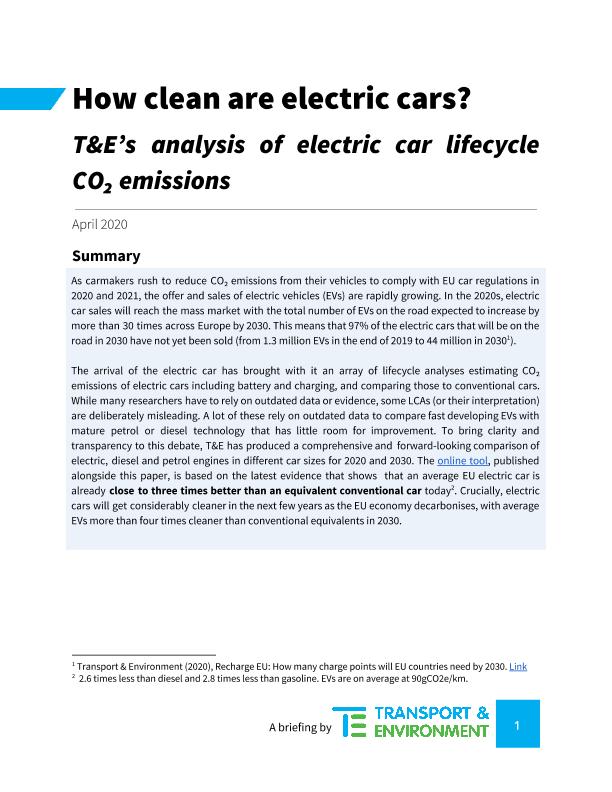How clean are electric cars? : T&E's analysis of electric car lifecycle CO2 emissions

Contenido multimedia no disponible por derechos de autor o por acceso restringido. Contacte con la institución para más información.
| Tag | 1 | 2 | Value |
|---|---|---|---|
| LDR | 00000cam a22000004b 4500 | ||
| 001 | MAP20200014553 | ||
| 003 | MAP | ||
| 005 | 20200429105126.0 | ||
| 008 | 161230e20200401bel|||| ||| ||eng d | ||
| 040 | $aMAP$bspa$dMAP | ||
| 084 | $a892 | ||
| 245 | 1 | 0 | $aHow clean are electric cars?$b: T&E's analysis of electric car lifecycle CO2 emissions |
| 260 | $aBrussels$bTransport & Environment$c2020 | ||
| 300 | $a33 p. | ||
| 520 | $aAs carmakers rush to reduce CO2 emissions from their vehicles to comply with EU car regulations in 2020 and 2021, the offer and sales of electric vehicles (EVs) are rapidly growing. In the 2020s, electric car sales will reach the mass market with the total number of EVs on the, road expected to increase by more than 30 times across Europe by 2030. This means that 97% of the electric cars that will be on the road in 2030 have not yet been sold (from 1.3 million EVs in the end of 2019 to 44 million in 20301). The arrival of the electric car has brought with it an array of lifecycle analyses estimating CO2 emissions of electric cars including battery and charging, and comparing those to conventional cars. While many researchers have to rely on outdated data or evidence, some LCAs (or their interpretation) are deliberately misleading. A lot of these rely on outdated data to compare fast developing EVs with mature petrol or diesel technology that has little room for improvement. To bring clarity and transparency to this debate, T&E has produced a comprehensive and forward-looking comparison of electric, diesel and petrol engines in different car sizes for 2020 and 2030. The online tool , published alongside this paper, is based on the latest evidence that shows that an average EU electric car is already close to three times better than an equivalent conventional car today. Crucially, electric cars will get considerably cleaner in the next few years as the EU economy decarbonises, with average EVs more than four times cleaner than conventional equivalents in 2030. | ||
| 650 | 4 | $0MAPA20080557287$aAutomóviles | |
| 650 | 4 | $0MAPA20100011164$aVehículos eléctricos | |
| 650 | 4 | $0MAPA20080575793$aEmisiones de CO2 | |
| 650 | 4 | $0MAPA20080582494$aSector automoción | |
| 650 | 4 | $0MAPA20100011164$aVehículos eléctricos | |
| 650 | 4 | $0MAPA20080617219$aIndustria automovilística | |
| 650 | 4 | $0MAPA20080586485$aMotores eléctricos | |
| 650 | 4 | $0MAPA20080588618$aVehículos de motor | |
| 650 | 4 | $0MAPA20080594589$aAnálisis comparativo | |
| 650 | 4 | $0MAPA20120024625$aCiclo de vida | |
| 710 | 2 | $0MAPA20190010160$aTransport & Environment |

